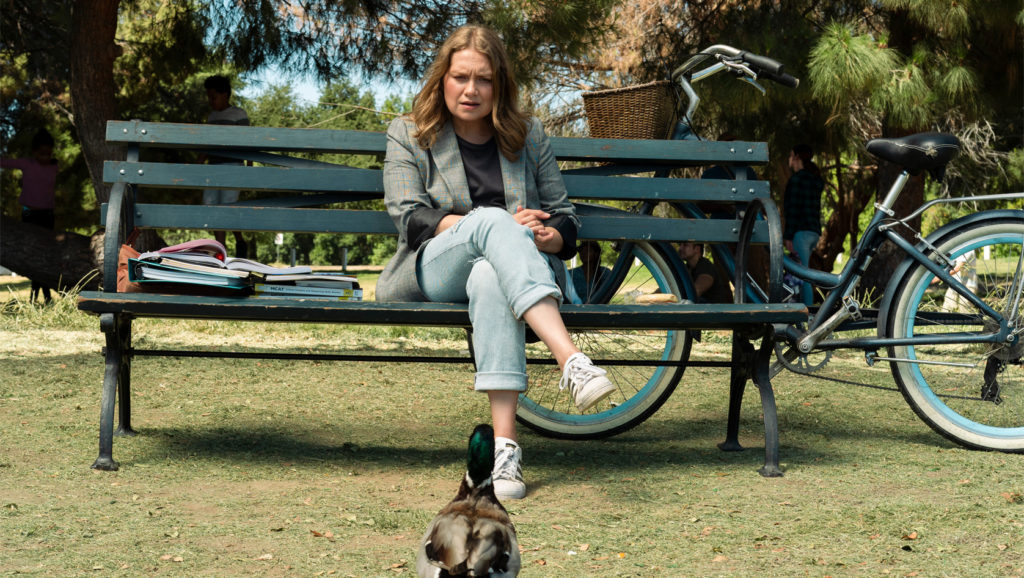
For as much as gender equality has gotten better in recent years, especially as compared with previous generations, there still exists a distinct gap when it comes to pay and representation within many industries. The fact that women still move through the world in a different way than men spurs some into activism and leaves others desolate about their prospects, regardless of how hard they may work. One thing is clear: there are many ways to define the experience of being a woman. Apple TV+’s new anthology series Roar approaches that concept with a larger-than-life attitude, transforming societal truths into peculiar fantasies.
Based on Cecelia Ahearn’s book of short stories, Roar runs eight half-hour episodes, each of which stars a different actress. There isn’t much stylistic or storyline similarity from installment to installment other than to introduce another woman who encounters a roadblock in her journey to success. There’s a real range to what that means. Each title offers a preview, in some cases presenting more questions, like “The Woman Who Was Fed By A Duck” or “The Woman Who Returned Her Husband.” Others, like “The Woman Who Found Bite Marks on Her Skin” and “The Woman Who Solved Her Own Murder,” require less guesswork even if their contents are still unexplainable.

What works so well about Roar is that the inconceivable and impossible are presented in a way that cannot be denied. When Becky (Alison Brie) walks over to find two detectives examining her dead body, she doesn’t understand how she could be dead but sees that it is clearly happening. Elisa (Merritt Wever) hears a duck talking to her in a park and knows that animals don’t speak, but she nonetheless begins to engage in conversation. Amelia (Betty Gilpin) is told by her new husband that he would love to have her sit (and live) on a shelf so that he can look up at her while he works, and somehow that idea isn’t the strangest and most outrageous concept ever.
This series brings to mind a classic known for its unexplained mysteries: The Twilight Zone. What sets it apart, and may make it even more frightening for some viewers, is that it takes place within an otherwise normal world. There is no introductory narration to warn those watching that they are about to be transported somewhere inexplicable and confounding, and it is typically only the protagonists who are aware that something is amiss. The selection of a diverse crop of top-tier actresses to guide audiences on those mind-bending journeys is keys, and Roar excels on that front.

The order in which episodes are screened may not make a difference given that plotlines do not continue from one to another. Issa Rae strongly anchors “The Woman Who Disappeared,” as effective a first installment as any, setting a solid tone that tangles up pro. While the second and eighth episodes feature worthwhile turns from Nicole Kidman and Judy Davis, and Fivel Stewart and Kara Hayward, respectively, their specific stories may not intrigue as much given that they’re not as outwardly extraordinary. Yet the advantage of anthology series is that each installment is different, which means great characters won’t appear again but every time the credits roll, it’s a chance to enter an entirely new world.
Roar presents a distinctly female perspective, one that taps into the ways in which casual – and serious – discrimination give way to the attempted erasure of identity. This series is about people finding a voice for themselves in entirely unusual and unexpected ways, determined to be seen and understood even if they are struggling with comprehending their circumstances. Taken together, the episodes are unnerving and fascinating, pushing the boundaries of believability to reveal greater truths that are easier to see and acknowledge when shown in front of a backdrop that doesn’t look exactly like the world we know.
Grade: B+
Check out more of Abe Friedtanzer’s articles.
All eight episodes of Roar premiere globally on Friday, April 15th on Apple TV+.

